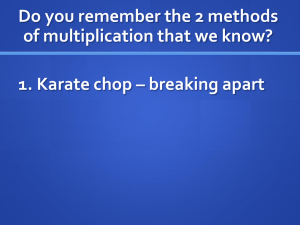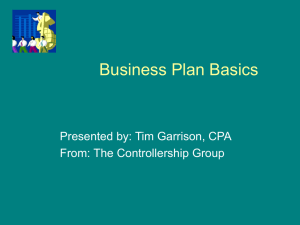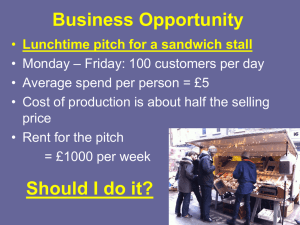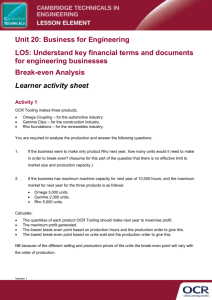Product - Tod Roberts
advertisement
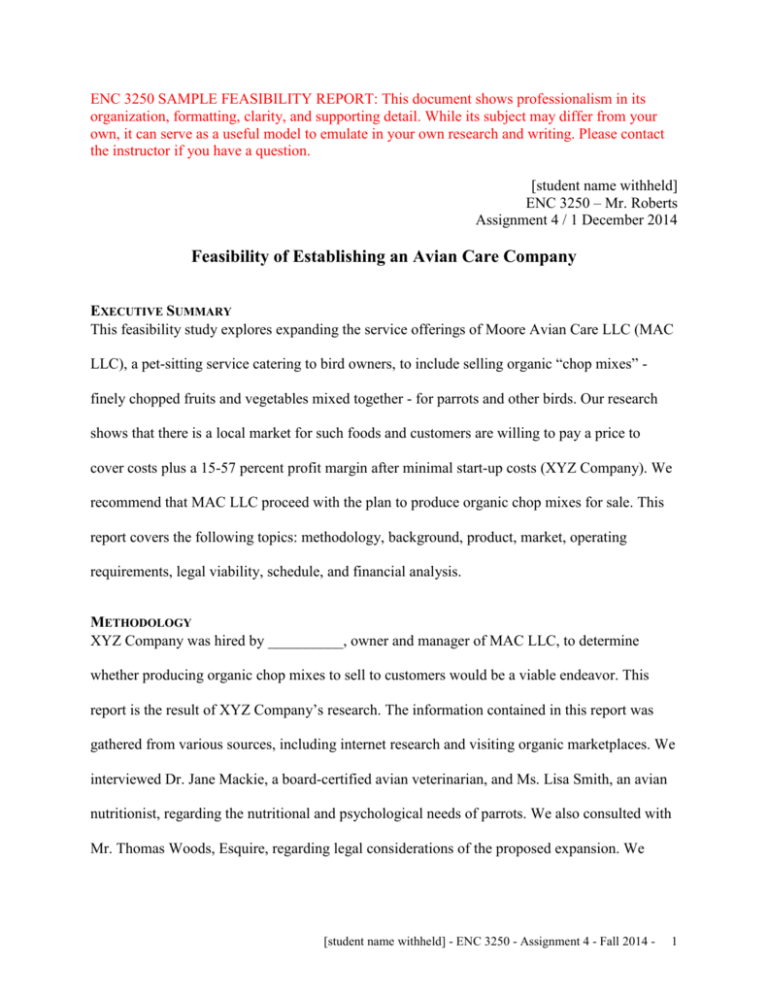
ENC 3250 SAMPLE FEASIBILITY REPORT: This document shows professionalism in its organization, formatting, clarity, and supporting detail. While its subject may differ from your own, it can serve as a useful model to emulate in your own research and writing. Please contact the instructor if you have a question. [student name withheld] ENC 3250 – Mr. Roberts Assignment 4 / 1 December 2014 Feasibility of Establishing an Avian Care Company EXECUTIVE SUMMARY This feasibility study explores expanding the service offerings of Moore Avian Care LLC (MAC LLC), a pet-sitting service catering to bird owners, to include selling organic “chop mixes” finely chopped fruits and vegetables mixed together - for parrots and other birds. Our research shows that there is a local market for such foods and customers are willing to pay a price to cover costs plus a 15-57 percent profit margin after minimal start-up costs (XYZ Company). We recommend that MAC LLC proceed with the plan to produce organic chop mixes for sale. This report covers the following topics: methodology, background, product, market, operating requirements, legal viability, schedule, and financial analysis. METHODOLOGY XYZ Company was hired by __________, owner and manager of MAC LLC, to determine whether producing organic chop mixes to sell to customers would be a viable endeavor. This report is the result of XYZ Company’s research. The information contained in this report was gathered from various sources, including internet research and visiting organic marketplaces. We interviewed Dr. Jane Mackie, a board-certified avian veterinarian, and Ms. Lisa Smith, an avian nutritionist, regarding the nutritional and psychological needs of parrots. We also consulted with Mr. Thomas Woods, Esquire, regarding legal considerations of the proposed expansion. We [student name withheld] - ENC 3250 - Assignment 4 - Fall 2014 - 1 designed and administered a marketing survey to current clients of MAC LLC and members of a local parrot club. BACKGROUND Healthy parrots require fresh fruits and vegetables daily (Mackie, Smith). In the interest of saving time, many parrot owners make a basic “chop mix” of finely chopped fruits and vegetables in large batches, freeze into small portions, and thaw out individual portions as needed. According to Ms. Moore, this endeavor takes two to three hours to make a one month supply for one medium-sized parrot. Tasks include cooking and cooling beans and grains, chopping fruits and vegetables finely by hand or food processor, mixing ingredients, and spooning into 4” x 6” plastic bags for freezing (Moore). Making chop mixes for multiple parrots can easily take eight hours. Owners would purchase organic chop mixes for the convenience of saving time while still feeding their parrots healthy foods (XYZ Company). The only constraint placed on this study was that the chop mixes be made with organic fruits and vegetables rather than conventionally grown produce. Studies have shown that the pesticides used on conventionally grown produce can cause health problems in parrots such as feather plucking, neurological disorders, and toe-tapping syndrome/wing-flipping syndrome (Mackie, Smith). Also, parrot owners indicated that they preferred organic over conventionally grown fruits and vegetables due to concerns over pesticides (XYZ Company). The chop mixes may provide a psychological benefit over pelleted foods due to their visual appeal. Parrots are intelligent, highly visual animals and become bored without appropriate physical and mental stimulation. Bored parrots will act out by screaming, biting, and pulling out their feathers. The ingredients of the chop mix are varied in colors, size and texture qualities appealing to a parrot (Mackie). [student name withheld] - ENC 3250 - Assignment 4 - Fall 2014 - 2 PRODUCT The product is “chop mixes” made from organic fruits and vegetables mixed together. Results from the marketing surveys and interviews with Dr. Mackie and Ms. Smith uncovered several considerations for the chop mixes. 90 percent of survey respondents preferred organic over conventional produce due to concerns about pesticides causing health problems in parrots. 30 percent of survey respondents indicated that they would only order a chop mix without corn, soy or rice (XYZ Company). Dr. Mackie and Ms. Smith made several recommendations regarding the chop mixes. First, nuts and seeds should be omitted from the mix since they are high in fat and can contribute to obesity. It could be difficult for owners to monitor their parrots’ nut and seed intake if the mix contains those items. Second, two versions of the mix should be offered: one version with corn, rice and soy, and the other version without these common allergens. Lastly, the mixes should be made from organically grown fruits and vegetables rather than from conventionally grown produce (Mackie, Smith). The product comes in 30 day supplies for three sizes of parrots: small (canary, budgie, conure, cockatiel, lovebird), medium (eclectus, African grey, amazon, small cockatoo, minimacaw), and large (large macaw, large cockatoo). The proposed prices are $20.00 for small, $30.00 for medium, and $40.00 for large, as per survey results (XYZ Company). MARKET The target market consists of current clients of MAC LLC and local parrot owners living within a 50-mile radius of Bradenton, Florida. Prospective customers can be reached through MAC LLC’s client base, MAC LLC’s website, advertisement in the Sarasota Pet Pages, advertisement in the newsletters of local bird clubs, renting a vendor booth at local bird fairs, and by word-ofmouth. [student name withheld] - ENC 3250 - Assignment 4 - Fall 2014 - 3 Manufacturers of organic pelleted food for parrots are MAC LLC’s main competition. Organic pellets are priced lower than the proposed chop mixes and are more readily available in pet stores and online. However, they do have two major drawbacks. First, pelleted foods contain added vitamins and minerals which can cause toe-tapping syndrome/wing-flipping syndrome in parrots. Second, pellets are uniform in color, size and texture, thereby possibly contributing to a parrot’s boredom and resulting maladaptive behaviors (Mackie). OPERATING REQUIREMENTS This section covers what resources are needed and their cost. It also covers how the product will be delivered to the customers. Materials needed Cost Food permits Replacement blades for food processor Cooler for transporting frozen chop mixes during delivery Cooler for transporting frozen chop mixes during delivery Permitted commercial kitchen Labor Organic produce Plastic bags $150.00/person $50.00/disc $50.00 Type of Cost Start-up Start-up Start-up $50.00 Start-up $135.00/month for 8 hours $15.65/hour for 8 hours/month Varies $5.00/box, 100 count 4”x6” plastic “Ziploc” bags $20.00/box, 100 sheets 6 labels each $10.00/month for 10 pounds $3.00/gallon @ 20 mpg, 200 miles/month Fixed Fixed Variable Variable Label paper Dry ice for cooler during delivery Gasoline for delivery vehicle Variable Variable Variable Start-up costs total $250.00. Fixed costs total $260.00 per month. Variable costs will depend on the number and size of orders placed. MAC LLC will use Ms. Moore’s personal food processor, rice cooker, stock pots, miscellaneous kitchen utensils, and laser printer. Customers will receive their orders within one week of production. Ms. Moore will deliver the orders personally. [student name withheld] - ENC 3250 - Assignment 4 - Fall 2014 - 4 LEGAL VIABILITY The chop mixes fall under the purview of §500 Florida Food Safety act since they will be produced with human-grade organic fruits and vegetables (Woods). As such, anyone producing the chop mixes for MAC LLC will need to obtain a food handler’s permit before commencing production (The Florida Senate §500.12). Also, the chop mixes will need to be prepared in a permitted food establishment. A commercial kitchen with a food permit issued by Department of Agriculture and Consumer Services that rents space by the hour is an acceptable manufacturing facility (The Florida Senate §500.03). There are several such kitchens in the Tampa Bay area. Note: The chop mixes do not fall under the purview of §500.80 Florida Cottage Food Operation law, because they can spoil and become potentially hazardous (The Florida Senate §500.03). MAC LLC will not need to amend its operating agreement filed with the state of Florida to include food production. They are already licensed to do any legal business in the state (Woods). SCHEDULE Production of the chop mixes can begin in one month or less. The first step is for Ms. Moore to obtain a food handler’s permit. Classes are held monthly at Your Pro Kitchen in Largo, Florida. The next step is to rent space from a permitted commercial kitchen such as Your Pro Kitchen. The third step is to purchase the organic produce from Whole Foods Market which is open every day of the week. Once all this has occurred, production can begin. Orders will be filled on a monthly basis coinciding with the kitchen rental. MAC LLC should publish a production schedule on its website. If there is enough demand to justify the extra cost for kitchen rental, orders can be filled mid-month. [student name withheld] - ENC 3250 - Assignment 4 - Fall 2014 - 5 FINANCIAL ANALYSIS Financial analysis shows that MAC LLC can realistically achieve a 15-57 percent profit margin based on 20-40 orders for various-sized parrots per month. Survey results indicate that 40 of 50 MAC LLC clients would purchase the chop mix. 20 percent of the orders would be for small parrots, 50 percent for medium parrots, and 30 percent for large parrots. The proposed prices are $20.00 for the small size, $30.00 for the medium size, and $40.00 for the large size (XYZ Company). The following break-even and net profit analysis is based on these assumptions. We provide a second pricing model of $15.00, $25.00 and $35.00 for small, medium and large, respectively, for contrast. Pricing Option A Sale Price per Unit - Variable Cost per Unit = Contribution Margin(CM) per Unit x Sales Mix Percentage Sum: Weighted Average CM per Unit Small $20.00 7.50 $12.50 20% $2.50 $15.25 Medium $30.00 15.00 $15.00 50% $7.50 Large $40.00 22.50 $17.50 30% $5.25 Total Fixed Costs / Weighted Average CM per Unit = Break-even Point in Units of Sales Mix $260.00 $15.25 17.05 Product Sales Mix Percentage x Total Break-even Units = Product Units at Break-even Point Small 20% 17.05 $3.41 Medium 50% 17.05 $8.52 Large 30% 17.05 $5.11 Product Product Units at Break-even Point x Price per Unit = Product Sales in Dollars Sum: Break-even Point in Dollars Small 3.41 $20.00 $68.20 $528.52 Medium 8.52 $30.00 $255.74 Large 5.11 $40.00 $204.59 40 Orders Total Gross Profit Break-even Point in Dollars Net Profit Profit Margin $1,240.00 ($528.52) $711.48 57% 30 Orders Total Gross Profit Break-even Point in Dollars Net Profit Profit Margin $930.00 ($528.52) $401.48 43% 20 Orders Total Gross Profit Break-even Point in Dollars $620.00 ($528.52) [student name withheld] - ENC 3250 - Assignment 4 - Fall 2014 - 6 Net Profit Profit Margin $91.48 15% Pricing Option B Sale Price per Unit - Variable Cost per Unit = Contribution Margin per Unit x Sales Mix Percentage Sum: Weighted Average CM per Unit Small $15.00 7.50 $7.50 20% $1.50 $10.25 Total Fixed Costs / Weighted Average CM per Unit = Break-even Point in Units of Sales Mix $260.00 $10.25 25.37 Product Sales Mix Percentage x Total Break-even Units = Product Units at Break-even Point Medium $25.00 15.00 $10.00 50% $5.00 Large $35.00 22.50 $12.50 30% $3.75 Small 20% 25.37 $5.07 Medium 50% 25.37 $12.68 Large 30% 25.37 $7.61 Product Product Units at Break-even Point x Price per Unit = Product Sales in Dollars Sum: Break-even Point in Dollars Small 5.07 $15.00 $76.10 $659.51 Medium 12.68 $25.00 $317.07 Large 7.61 $35.00 $266.34 40 Orders Total Gross Profit Break-even Point in Dollars Net Profit Profit Margin $1,040.00 ($659.51) $380.49 37% 30 Orders Total Gross Profit Break-even Point in Dollars Net Profit Profit Margin $780.00 ($659.51) $120.49 15% 20 Orders Total Gross Profit Break-even Point in Dollars Net Profit Profit Margin $520.00 ($659.51) ($139.51) -27% In pricing model A, the break-even point is 17.05 units and $528.52 in sales dollars. 40 orders yield $711.48 in net profits or a 57 percent profit margin, 30 orders yield $401.48 or 43 percent, and 20 orders yield $91.48 or 15 percent. In pricing model B, the break-even point is 25.37 units and $659.51 in sales dollars. 40 orders yield $380.49 in net profits or a 37 percent profit margin, 30 orders yield $120.49 or 15 percent, and 20 orders yield ($139.51) or -27 percent. The difference in prices is only $5.00, but profits from option B would be 20-42 percent lower than [student name withheld] - ENC 3250 - Assignment 4 - Fall 2014 - 7 option A given the 20%/50%/30% sales mix. If MAC LLC decides to sell their product using pricing option B, they may find it difficult to turn a profit if demand drops from initial expectations. CONCLUSION AND RECOMMENDATION Expanding MAC LLC’s business to include selling organic chop mixes for parrots is a very viable option. There is documented demand for the product and built-in monthly repeat business as the customers’ supply runs out. Start-up costs are minimal. The product can be sold at a 15-57 percent profit for 20-40 orders per month based on pricing option A. This yields as much as $711.48 in net profits per month. The generous profit margin allows MAC LLC to absorb minor unpredictable costs such as gas prices for delivery and fluctuating food prices and to offer large volume discounts. Due to economy of scale, producing chop mixes for ten parrots would not take ten times as long as it does for one. __________ is confident that she can produce the mixes on a large scale within an eight hour window. Should the venture fail, MAC LLC will be out only $250 equal to the start-up costs. Since the chop mixes can be produced at a minimal cost in only one day for a respectable profit, there is no reason not to proceed with the expansion. Sources Consulted "The Florida Senate." Chapter 500 Section 03. Web. 30 Nov. 2014. <http://www.flsenate.gov/Laws/Statutes/2012/500.03>. "The Florida Senate." Chapter 500 Section 12. Web. 30 Nov. 2014. <http://www.flsenate.gov/Laws/Statutes/2012/500.12>. Mackie, Jane, DVM. Personal interview. 10 November 2014. Moore, Jennifer. Personal interview. 1 November 2014. Smith, Lisa. Personal interview. 9 November 2014. Woods, Esq., Thomas. Personal interview. 12 November 2014. XYZ Company. “Marketing Survey Conducted for Moore Avian Care LLC.” Survey. 15 November 2014. [student name withheld] - ENC 3250 - Assignment 4 - Fall 2014 - 8
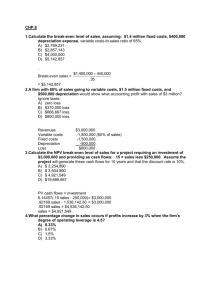
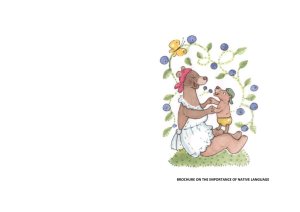

![Your_Solutions_LLC_-_New_Business3[1]](http://s2.studylib.net/store/data/005544494_1-444a738d95c4d66d28ef7ef4e25c86f0-300x300.png)
